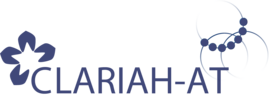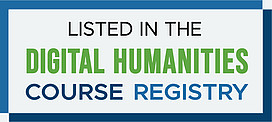FAQs on the study programme
Slides with general information: "Studying Digital Humanities”
1) Who is the programme aimed at?
The programme is aimed at students with a Bachelor’s degree in the humanities or cultural sciences who want to equip themselves with the relevant tools for the digital utilisation of their existing skills. Apart from general computer literacy, no specific (technical) knowledge is required and there are no additional entry requirements. However, a certain affinity for IT-supported working methods would definitely be advantageous.
In principle, it is possible for graduates with more technical backgrounds to undertake study in the Digital Humanities Master programme, however they must either show evidence of completed courses in the humanities or complete them during the Master’s programme (for further details, please contact the CuKo chairperson).
Those who haven’t completed a relevant Bachelor’s degree and want to study the Digital Humanities Master’s programme must contact the relevant CuKo chairperson to see if they are eligible. Applying for non-consecutive enrollment (i.e. from a non-relevant Bachelor’s) is very time consuming (it takes several months) and should therefore be discussed well in advance.
2) How much of a technophile do I need to be for this programme? Is it like studying computer science? Do I need to have studied maths?
That totally depends on what you mean by ‘technophile’ and what you imagine studying computer science is like. Maths won’t be part of your studies at all.
For comparison, the programme module ‘Fundamentals of Computer Science’ (Grundlagen der Informatik) is largely comparable with similar modules at Graz Technical University (TU Graz), however at a significantly reduced level. Most of the other modules are not at all similar to computer science, although you will of course learn the basics of programming. Basic computer literacy (e.g. “how do I zip a document?” etc.) is required for the programme, however you can test whether you have these skills by going through “Worksheet 0” (Übungsblatt 0).
Not being able to answer or solve everything from “Worksheet 0” in advance shouldn’t deter you from the programme, however you should have the motivation to go and gain these computer skills independently. Those who don’t want to do this probably won’t enjoy studying this programme.
3) I’ve read that you need to have your own laptop for the programme? Which operating system do I need?
Anyone who seriously wants to study for a Master’s degree in Digital Humanities should have their own laptop, for which they have administrator rights to install new software. In some situations, the ZIM can help out with computers.
Using different operating systems is no problem. Students and lecturers use Windows, MacOS and Linux, depending on their personal preferences. There is no specific recommended operating system.
Exclusively using a tablet isn’t recommended, as not all software used during the courses exists for tablets.
4) In what languages are the courses taught?
The programme is designed to be taught in German, however there are English modules and some lecturers can conduct their modules in English.
5) Can I combine my studies with my work?
The programme is officially ‘full-time’. Modules are not guaranteed to fit around other work commitments. If you want some further tips about how this would work, it’s a good idea to ask other students who study and have part-time jobs.
6) Can I get credit for a relevant internship instead of through elective courses?
Elective modules totalling up to 12 ECTS (Curriculum 2017) or up to 9 ECTS (Curriculum 2021) are provided by the programme. A relevant internship (up to 8 weeks of full-time employment) can be credited instead, however this must be agreed with and approved by the CuKo chairperson in advance.
7) Does my compulsory elective module for the Master in Digital Humanities have to be the same subject area as my Bachelor’s?
In principle, it’s not mandatory, however it’s important to ensure that:
- the courses are assigned to a Master's degree programme,
- the subject of the compulsory elective module is included in the list of possible subjects,
- the student is authorised to attend and complete the modules listed for the subject
These requirements are met if the associated Bachelor's degree programme has been completed. In other cases, you should contact the relevant CuKo representative for additional admission information.
8) I already have a Master’s degree but I would like to stay in education and get another qualification. What is the most efficient way to do this?
Working towards a Master’s degree in the Digital Humanities as a supplementary qualification certainly makes sense. However, depending on how deeply you want to immerse yourself and how much time you have for work, the certificate module “Information Modelling in the Humanities” (Informationsmodellierung in den Geisteswissenschaften) could be a good alternative to the full Master’s programme.
This certificate awards 24 ECTS (attendance of 6 course units) and teaches practical knowledge, whilst sparing some of the detail of more theoretical modules, such as the ‘Fundamentals of Computer Science’ (Grundlagen der Informatik). The certificate is enough to prove basic knowledge in the Digital Humanities and – in comparison to the Master’s programme – can easily be fit around work and completed within the course of an academic year.







